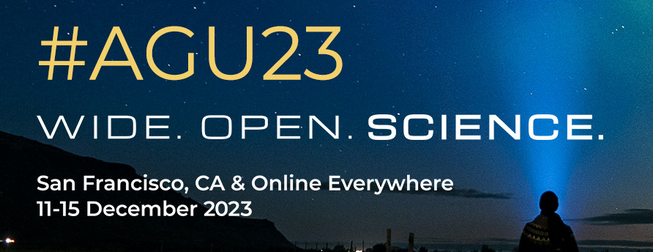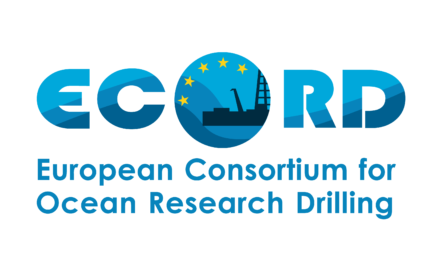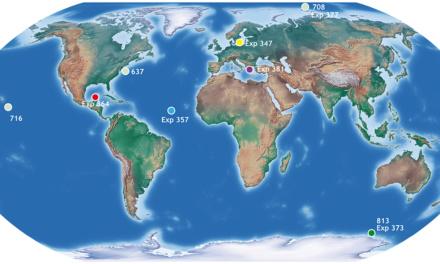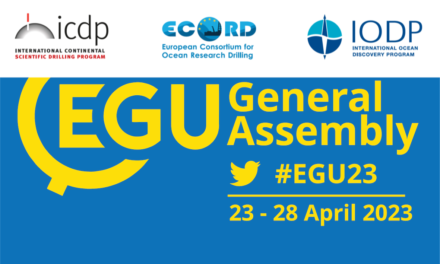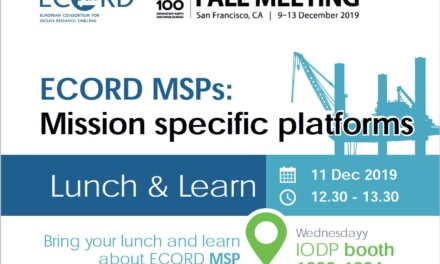The AGU Fall Meeting 2023 is quickly approaching. This year, there will be several scientific ocean drilling related sessions that may be of interest to you (see attached list of AGU sessions highlighting scientific ocean drilling).
One of these sessions that we would like to bring your attention to is Session OS019: Multidisciplinary Approaches in Scientific Ocean Drilling to Investigate Interactions Within the Earth System. We encourage you to submit your abstract to this session that will focus on scientific ocean drilling experiments to investigate spatial and temporal changes in the (sub)seafloor.
The deadline for abstract submission is August 2, 2023.
We look forward to your contribution and hope to see many of you in San Francisco (or online).
Link to session:
https://agu.confex.com/agu/fm23/prelim.cgi/Session/190653
Session Title:
OS019: Multidisciplinary Approaches in Scientific Ocean Drilling to Investigate Interactions Within the Earth System
Session Description:
Multidisciplinary approaches in scientific ocean drilling advance our understanding of the interconnections within the Earth system. We can reveal these dynamic interactions between Earth’s sediments, rocks, ocean, life, and atmosphere by focusing on spatial and temporal variations in subseafloor records of Earth’s past or of in-situ conditions. This can be achieved through 4D experiments, for example using transects of drill sites or through installation of (borehole) observatories that allow (sub-)seafloor monitoring and experimentation.
This session welcomes experimental, theoretical, modeling, and observation-based studies from recent and past International Ocean Discovery Program (IODP) expeditions that contribute to our understanding of the interactions between the formation of ocean crust, the sediment it accumulates, the deep biosphere they both host, and the overlying evolving oceans. Examples include studies from the South Atlantic Transect, Louisville Seamount Trail, and Juan de Fuca Ridge-Flank Hydrogeology. We encourage submissions of both ocean and continental drilling related results.
Co-Conveners:
Julia Reece, Texas A&M University
Rosalind Coggon, University of Southampton
Melody Lindsay, Bigelow Laboratories for Ocean Sciences
Preliminary list of AGU’23 sessions highlighting scientific ocean drilling
● GP015 Past Insights and Recent Advances in Paleomagnetism From the Study of Cores
Collected by the International Ocean Discovery Program (IODP) Research Vessel JOIDES
Resolution
● OS019 Multidisciplinary Approaches in Scientific Ocean Drilling to Investigate Interactions
Within the Earth System
● V026 Shallow Submarine and Emergent Explosive Volcanism: Deposits and Links to Internal
and External Triggers
● *B047 Life in the Deep Biosphere: Results from Scientific Ocean Drilling Investigations
● *PP016 Contributions of Scientific Ocean Drilling to Understanding Earth Systems Science
and Earth Systems History at High Latitudes
● V010 Deep crust in the Pacific from a drilling perspective
● *IN037 Novel Approaches in the Use of Scientific Ocean Drilling Data
● PP021 Evolution of the Paleogene Ocean-Climate System from Scientific Ocean Drilling Data
● OS026 Volcanic Rifted Margin Formation and Environmental Consequences
● *OS010 Gas hydrates in Earth’s subsurface
● PP012 Climate and Tectonic Archives of the North Pacific and Beringia: Insights into Fans,
Faults, Ice Sheets and Ocean Gateways
● S025 Progress in Submarine Paleoseismology towards Understanding Large Earthquake
Recurrence
● PP017 Cretaceous‒Paleogene Large Igneous Province Emplacement and Ocean History:
Impacts on Crustal Structure, Climate, and Circulation
● T003 Control of fault zone heterogeneity and fault roughness on multiscale deformation at
inter- and intra-plate fault zones
● SY024 Ocean and Earth Science: Creating Lasting Impact Through Education, Outreach and
Science Communication
● Town Hall The 2025 – 2035 Decadal Survey of Ocean Sciences for the National Science
Foundation: Community Input on Scientific Priorities to Advance Understanding of the
Ocean’s Role in the Earth System

